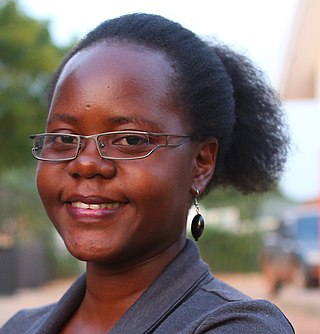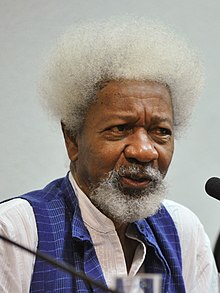
Akinwande Oluwole Babatunde Soyinka Hon. FRSL, known as Wole Soyinka, is a Nigerian playwright, novelist, poet, and essayist in the English language. He was awarded the 1986 Nobel Prize in Literature, for "in a wide cultural perspective and with poetic overtones fashioning the drama of existence", the first sub-Saharan African to be honoured in that category. Soyinka was born into a Yoruba family in Abeokuta. In 1954, he attended Government College in Ibadan, and subsequently University College Ibadan and the University of Leeds in England. After studying in Nigeria and the UK, he worked with the Royal Court Theatre in London. He went on to write plays that were produced in both countries, in theatres and on radio. He took an active role in Nigeria's political history and its campaign for independence from British colonial rule. In 1965, he seized the Western Nigeria Broadcasting Service studio and broadcast a demand for the cancellation of the Western Nigeria Regional Elections. In 1967, during the Nigerian Civil War, he was arrested by the federal government of General Yakubu Gowon and put in solitary confinement for two years, for volunteering to be a non-government mediating actor.

Nigerian literature may be roughly defined as the literary writing by citizens of the nation of Nigeria for Nigerian readers, addressing Nigerian issues. This encompasses writers in a number of languages, including not only English but Igbo, Urhobo, Yoruba, and in the northern part of the county Hausa and Nupe. More broadly, it includes British Nigerians, Nigerian Americans and other members of the African diaspora.
Yoruba literature is the spoken and written literature of the Yoruba people, one of the largest ethno-linguistic groups in Nigeria and the rest of Africa. The Yoruba language is spoken in Nigeria, Benin, and Togo, as well as in dispersed Yoruba communities throughout the world.
Tanure Ojaide is a Nigerian poet and academic. As a writer, he is noted for his unique stylistic vision and for his intense criticism of imperialism, religion, and other issues. He is regarded as a socio-political and an ecocentric poet. He won the 2018 Wole Soyinka Prize for Literature in Africa with his collection Songs of Myself: A Quartet (2017).
Wole Soyinka Prize for Literature in Africa is a pan-African writing prize awarded biennially to the best literary work produced by an African. It was established by the Lumina Foundation in 2005 in honour of Africa's first Nobel Laureate in Literature, Wole Soyinka, who presents the prize, which is chosen by an international jury of literary figures. Administered by the Lumina Foundation, the prize has been described as "the African equivalent of the Nobel Prize".

Ber Anena born and previously published as Harriet Anena is a Ugandan writer and performer, whose writing includes poetry, nonfiction and fiction. She is the author of a collection of poems, A Nation In Labour, published in 2015, won the 2018 Wole Soyinka Prize for Literature in Africa. The Economist described her poetry performance as "an arresting evocation of love and war".
Odia Ofeimun is a Nigerian poet and polemicist, the author of many volumes of poetry, books of political essays and on cultural politics, and the editor of two significant anthologies of Nigerian poetry. His work has been widely anthologized and translated and he has read and performed his poetry internationally.
Adedapo Abayomi Adelugba was a Nigerian academic, theatre critic and playwright who spent a considerable part of his academic career at University of Ibadan where he was a director of the university's theatre troupe. Adelugba was also the director of Nigeria's drama entry to the Second World Festival of Arts and Culture.

The 2016 Nobel Prize in Literature was awarded to the American singer-songwriter Bob Dylan "for having created new poetic expressions within the great American song tradition". The prize was announced by the Swedish Academy on 13 October 2016. He is the 12th Nobel laureate from the United States.

The 1982 Nobel Prize in Literature was awarded to the Colombian writer Gabriel García Márquez (1927–2014) "for his novels and short stories, in which the fantastic and the realistic are combined in a richly composed world of imagination, reflecting a continent's life and conflicts."

The 2017 Nobel Prize in Literature was awarded to the British novelist Kazuo Ishiguro "who, in novels of great emotional force, has uncovered the abyss beneath our illusory sense of connection with the world." The prize was announced by the Swedish Academy on 5 October 2017.

The 2021 Nobel Prize in Literature was awarded to the Tanzanian-born British novelist Abdulrazak Gurnah who the Swedish Academy members praised "for his uncompromising and compassionate penetration of the effects of colonialism and the fate of the refugee in the gulf between cultures and continents." The winner was announced on October 7, 2021, by Mats Malm, permanent secretary of the Swedish Academy.

The 2008 Nobel Prize in Literature was awarded to the French novelist Jean-Marie Gustave Le Clézio, better known with his pen name J. M. G. Le Clézio, as an "author of new departures, poetic adventure and sensual ecstasy, explorer of a humanity beyond and below the reigning civilization." He became the 14th French-language author to receive the Nobel Prize for Literature after Claude Simon in 1985 and was followed later by Patrick Modiano in 2014.

The 1993 Nobel Prize in Literature was awarded to the African-American novelist Toni Morrison (1931–2019) "who in novels characterized by visionary force and poetic import, gives life to an essential aspect of American reality." Morrison was awarded before the third novel of the Beloved Trilogy was published. She became the first black woman of any nationality and the second American woman to win the prize since Pearl S. Buck in 1938. She is also the 8th woman to receive the prize.

The 2003 Nobel Prize in Literature was awarded to the South African novelist John Maxwell Coetzee, better known simply as J. M. Coetzee, "who in innumerable guises portrays the surprising involvement of the outsider." He is the fourth African writer to be so honoured and the second South African after Nadine Gordimer in 1991.

The 1994 Nobel Prize in Literature was awarded to the Japanese novelist Kenzaburō Ōe (1953–2023) "who with poetic force creates an imagined world, where life and myth condense to form a disconcerting picture of the human predicament today." He is the second Japanese Nobel laureate in Literature after Yasunari Kawabata was awarded in 1968.

The 1992 Nobel Prize in Literature was awarded to the Saint Lucian poet Derek Walcott (1930–2017) "for a poetic oeuvre of great luminosity, sustained by a historical vision, the outcome of a multicultural commitment." He became the first and only Caribbean writer to be awarded with the prize.

The 2000 Nobel Prize in Literature was awarded to the Chinese émigré writer Gao Xingjian "for an æuvre of universal validity, bitter insights and linguistic ingenuity, which has opened new paths for the Chinese novel and drama." He is the first Chinese recipient of the prize followed by Mo Yan in 2012.

The 1987 Nobel Prize in Literature was awarded to the Russian–American poet and essayist Joseph Brodsky (1940–1996) "for an all-embracing authorship, imbued with clarity of thought and poetic intensity."














